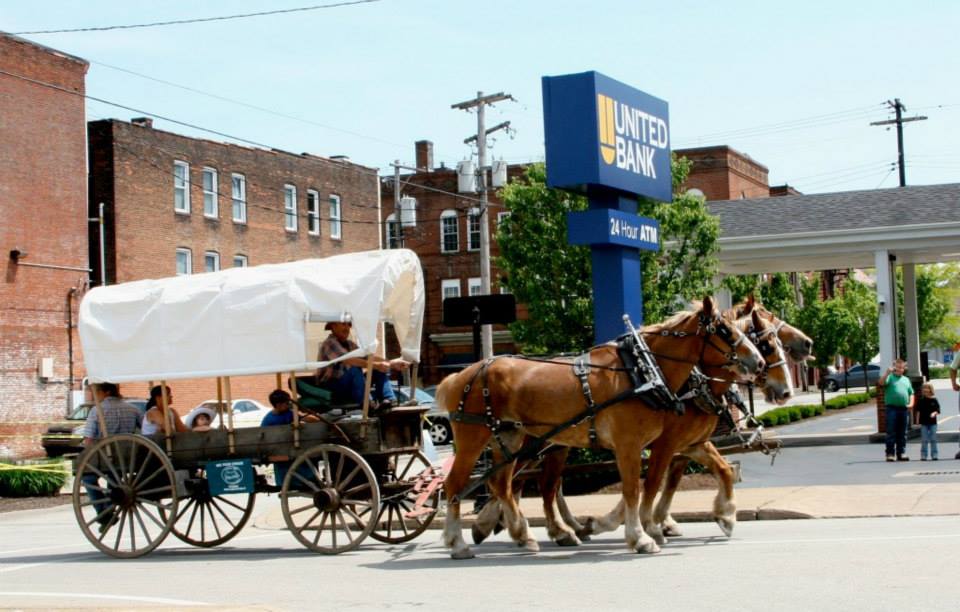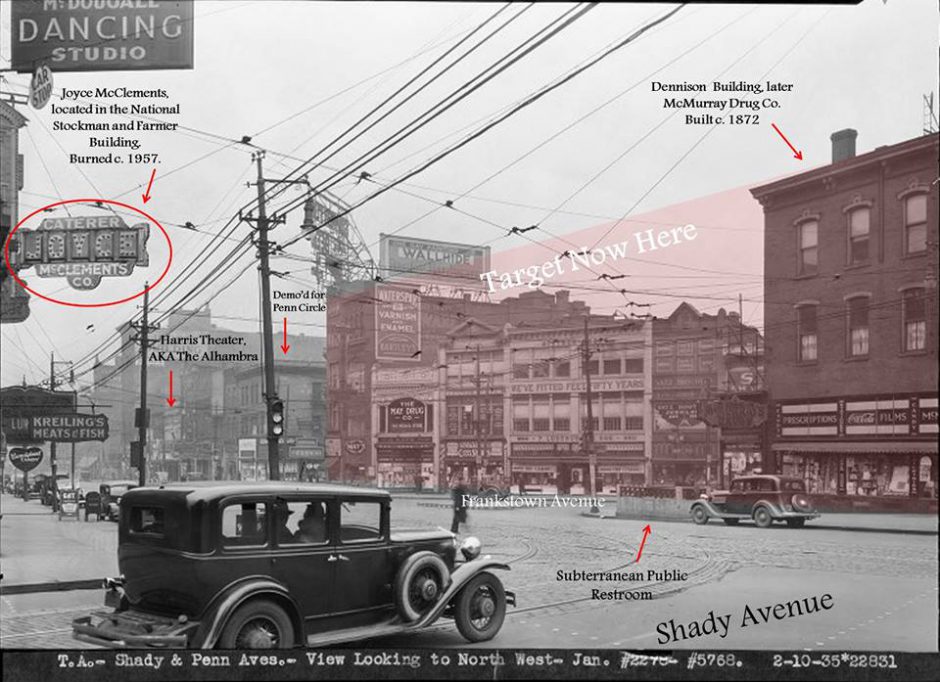As city lover, I never thought I would ever find room in my heart for highways. But after driving cross country and learning about the history of Route 66, I will admit I have made space in my heart for the open road.
This weekend is the 44th Annual National Road Festival. Just when I thought I had heard of every possibly historic festival in Western, PA, Facebook suggests an event and I’ve spent hours learning about all kinds of new history and places. Route 66 is about celebrating the car culture of America, the National Road Festival goes back even further to when we traveled west by wagons.
If you are interested in exploring or looking for a little road trip, then the Nation Road Festival offers plenty of events and activities along the way.
What is the National Road? Does it run through Pittsburgh?

The National Road which was know by several other names during its early days, was the first federal highway. The road is 620 miles long and stretches from Vandalia, Illinois to Cumberland, Maryland.
While the National Road does not go directly through Pittsburgh, all of the Pennsylvania locations are an easy day trip from Pittsburgh. The National Road travels through the counties of Somerset, Fayette and Washington.
The only website I can find for the National Road is NationalRoadPA.org, I am not sure if this is just for the National Road in Pennsylvania or if the nonprofit organization happens to be located in Pennsylvania but covers all of the National Road.
The 44th Annual National Road Festival Events in PA
The Facebook Event for the 44th Annual National Road Festival includes a schedule of all of the events happening in Somerset, Fayette and Washington Counties. It is unclear to me if there are National Road Festival events taking place in other states this weekend as well. The entire schedule is available online here.
Here ares some of the highlights of National Road Festival events happening this weekend, I have tried to find a website/more info for each of these locations, if you are planning to visit for a specific event, I would use the number listed in the festival schedule and call to confirm times before going.
What is a Wagon Train?

2014 – The wagon train passing down Main Street during the National Road Festival in Uniontown. Photo credit: Uniontown Concerned Citizens.
You will see several events which mention the “Wagon Train” which is an actual train of wagons that travels the National Road for the festival. From the Herald Standard’s recent article about the National Road Festival:
If there’s a thread that holds the festival together is the two wagon trains that travel through towns and pass by area landmarks.
The National Pike Wagon Train Association travels west, led by wagon master Doc Sherry and assistant wagon master Don Myers. They gathered for encampment yesterday in Grantsville, Maryland, and head out today for Addison, Somserset County. On Friday, the wagon train continues into Fayette County and the Farmington Volunteer Fire Department with a stop at A.J. McMullen School, part of the Uniontown Area School District, for lunch and to allow the children to visit. On Saturday, the wagon train heads down the Summit with a stop for lunch in Hopwood before heading through Uniontown and onto Mount St. Macrina, just west of Uniontown, where they will rest and have dinner before the wagon train breaks up and the participants head home.
The Wagonier’s Wagon Train travels east across Washington County, led by wagon master J.D. Ridenour. The wagon train gathers Friday morning in Claysville, Washington County, and camps overnight at Washington Park. The wagon train arrives in Scenery Hill at 2 p.m. Saturday for super and an overnight camp. It departs Sunday, heading to the Waleski Farm for lunch around noon and then on to the National Pike Steam, Gas and Horse Association around 2 p.m. The wagon train breaks up about 4 p.m.
Participants in the wagon train dress in period costume to portray pioneers who traveled west on the National Road in the early 19th century, showcasing the American spirit.
44th Annual National Road Festival Highlighted Events Near Pittsburgh
| Town | Location | Events |
| Richeyville, PA | Waleski Horse Farm 38 Emery Road |
Saturday –Blue Grass Music Sunday at noon the Wagon Train will make a stop for lunch. |
| Brownsville, PA | Nemacolin Castle | History Tours: Friday -noon –5:00pm Saturday –10:00am-5:00pm Sunday-11:00am-5:00pm Ghost Tours: Friday & Saturday-6:00PM-10:00PM (*Tours-$10-adults; $4.00 12 & under) |
| Scenery Hill, PA | Saturday: 10:00am – Opening ceremony 10:30am – B& B Performing Arts 12:00 noon – Spirit & Grace 1:30pm –WAGON TRAIN ARRIVES 2:00pm– Keith Wilson 3:00pm– Scotty SpharSunday: 9:00am – Community Church Service 11:30am-Kenny & Chip 12:00 noon—Kenny & Chip 1:00pm – Tap n’ Toes Dance Studio 2:15pm – Deborah’s School of Dance 3:30pm—”The Rain Dogs” (acoustic) |
|
| Washington, PA | Main St Pavilion | Saturday, May 20th -8am – 5pm National Road Antiques Fair –20 vendors offering antiques from 18th, 19th & 20th centuries.Historic walking tours –meet at 1pm at Main St Pavilion with Sandy Mansmann for walking tour of historic downtown Main St buildingsFrancis LeMoyne House –take a tour of this Underground railroad site& visit the Military Heritage Museum (Sat & Sun 11am-3pm) David Bradford House –Living history demos and activities. Museum open for self guided tours with docents in period attire (Sat&Sun 11am–3pm) |
| Smock, PA | Abel Colley Tavern | Noon until 5pm The Abel Colley Tavern & Museum will host an exhibit of newly acquired Native American Artifacts; children’s activities; a 19th century operating telegraph; illustrated story of Ephram Walters, who was captured by Native Americans and Traditional National Road Era menu items and Book Sale. Admission $5.00 |
| Uniontown, PA | Searight Toll House | Saturday – 11am – 4pm Guided Tours Sunday, Noon – 4pm Guided tours Admission both days : Adults – $2.00; $1.00 /student -Children 12 & under Free; |
| Uniontown, PA | Mount Saint Macrina | Saturday 3:00pm –Approximate arrival of Wagon Train. 1:00-3:00pm – Mansion Tours by Laurel Highlands High school history students in period costumes. Music performed by a pianist. Adults -$12.00; Children (6-12) $5.00 |
| Farmington, PA | Mt Washington Tavern |
Sat-Sun –10am-4pm Ft Necessity National Battlefield and Mount Washington Tavern will be open daily from 10am to 4pm. Park staff and volunteers will staff the buildings to answer questions. Entrance fee is free and all activities and pro |
| Ohiopyle, PA | Ohiopyle Stewart Community Center |
Saturday, 12pm—7:00pm – 3rd Annual Wine and Arts Festival, hosted by Spirit of the River —The town of Ohiopyle and surrounding community will be hosting a Wine, Arts and Music Festival. No charge for admission— ticket sales for Spirit Tasting only – and must be 21 with valid ID. Local Crafts, local music and art. Tickets are $25, you donations is used to raise funds for support of the boro of Ohiopyle. Spirit of the River: Ohiopyle Wine and Arts Festival Facebook Event |
| Addison, PA | Addison, PA | Saturday, May 20
Sunday, May 21st
|











